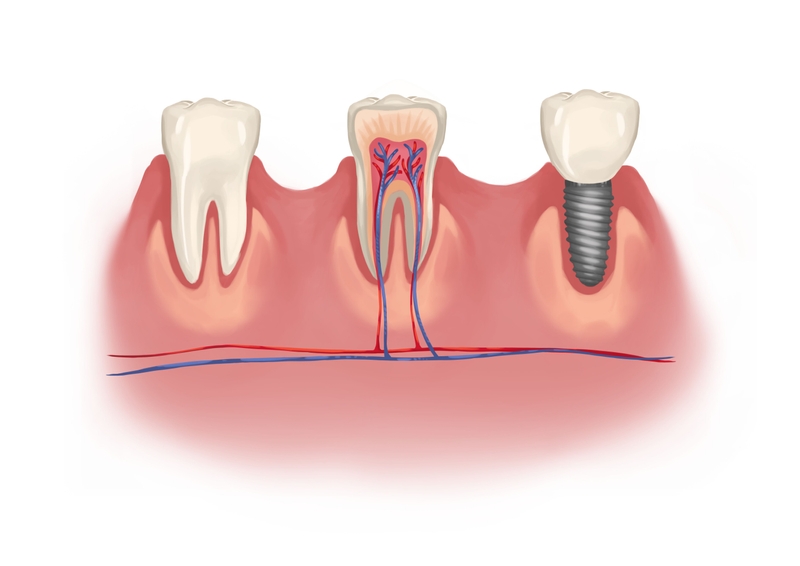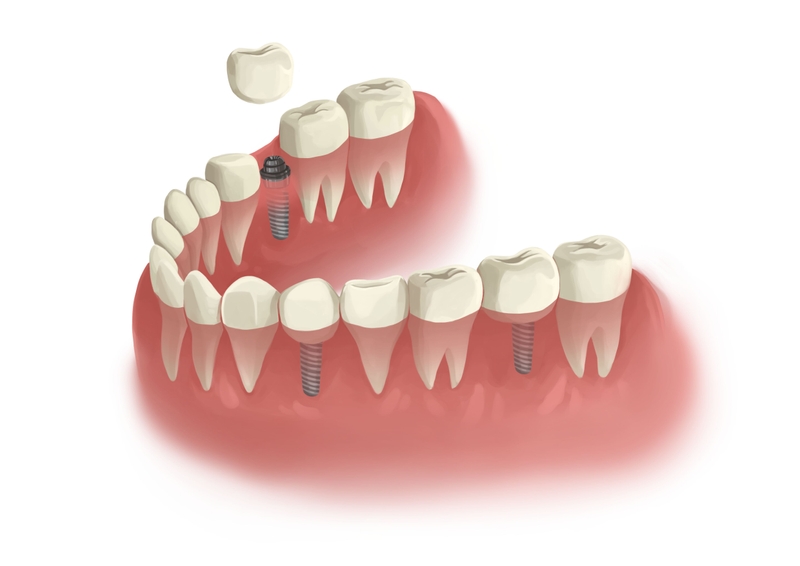- Dental implant recovery is not the end of the process and can be uncomfortable. The recovery period is necessary for the mouth to heal and the implant to fuse with the bone.
- It is normal to experience discomfort or pain as the dental implant heals. The healing process varies depending on the number and position of the implants, oral hygiene, smoking habits, and other factors.
- A diet for dental implant recovery should include mostly soft foods.
Your dream smile, one click away. Use Authority Dental to book an appointment for low-cost dental implants near you. It's fast, easy and reliable.
How should you manage your oral health after dental implant surgery? Here's everything you need to know.
What to expect during dental implant recovery?

Picture by Authority Dental under CC 2.0 license
The implant procedure is a surgical procedure. It is expected that you will need some downtime. The following symptoms are not complications, nor do they mean that something has gone wrong.
This is simply what the dental implant healing process is like, whether you are getting a single implant or a complete mouth restoration, such as the All-on-4. Remember to focus on excellent aftercare to support healing and prevent complications. Most of these symptoms can be resolved with rest and keeping the area clean.
Bleeding
There is bound to be some bleeding from the implant site for about 48-72 hours after the surgery. If your implant is in the upper arch or you had sinus lifting, you might also experience nasal bleeding.
Dentists often compare the oozing after implant placement to that after tooth extraction. There is likely to be even less bleeding, as the implant closes the gap that would otherwise remain open. Some patients may feel there is much bleeding, when in fact their saliva is just thinning it out.
Bruising
About 2-3 days after the surgery, you might notice some bruising on your face. This will disappear on its own.
The soft tissues in your mouth might also appear black, blue, green, or yellow. This discoloration occurs as blood rises to the surface of your gums during surgery and healing.
Swelling
The area around your mouth, cheeks, and eyes may swell up about 2 days after the procedure. This is common, especially with bone grafting. If you take a medication containing codeine or caffeine, the swelling is likely to disappear more quickly. You can also use a cold compress (20 minutes on and 20 minutes off) to bring it down.
The swelling should subside after about 4 days. If swelling worsens, the area feels hot, or you develop a fever, contact your dentist, as this may be a sign of a dental implant infection.
Discomfort
You are likely to feel some discomfort in the days following the surgery. There will be a new object in your mouth and bone. It might take some time to get used to it. Your lips may also feel dry and stretched. A sore throat and trouble swallowing are common, especially if you were sedated.
Implant placement does typically not cause a great deal of pain. Because bone has no nerve endings, drilling during or after surgery should not be painful. You will have anesthesia in your system for a few hours after you leave the office. This should help manage soft-tissue soreness.
Your dentist might recommend that you take some OTC painkillers before the sedation wears off. You should not need to take any for more than 3 days after your surgery.
Dizziness
You may feel light-headed after you leave the office. This is a natural side effect of anesthesia. It should subside within a few hours. Avoid physical exercise and bending over for a couple of days to prevent dizziness from returning.
Nausea and vomiting
Many patients feel nauseous after receiving anesthesia, especially if it was administered orally. This feeling should disappear within about 3 hours. You can take OTC products that suppress such discomfort.
Fever
An increased temperature is not uncommon after oral surgery. Please note that it should not exceed 101.5°F. If it does, contact your doctor.
What affects tooth implant recovery time?

Picture by Authority Dental under CC 2.0 license
Every patient is different, so it is difficult to say exactly how long your recovery will take. Some indicators help predict what it will be like for you. Among them are:
the number and location of implants,
quality of oral hygiene,
smoking habits,
how long the tooth was missing, and
whether bone grafting or sinus lifting was needed.
The more implants that are placed, the longer the healing might take. This is because the bone and gums have to endure more stress during the surgery. The location is also important, as the lower jawbone tends to heal faster than the upper arch.

Consistent oral hygiene before and during the implant process is vital to speed up recovery. Smoking, on the other hand, slows the process down. Nicotine constricts vessels, and blood is not free to flow to the soft tissues as efficiently. In the long term, this can even lead to implant failure.

A dental implant recovery diet should consist mainly of soft foods for at least 3 days. Good examples are smoothies, creamy soups, and yogurts.
Lee warns: "The real goal, however, is osseointegration, which takes three to six months. This is the silent, critical phase where the jawbone physically grows around and fuses to the titanium post. I warn every patient that their actions during this period are some of the most significant success factors. Clinical research repeatedly confirms that smoking is the number one enemy, dramatically restricting blood flow and drastically lowering the implant's success rate."
The period between losing your tooth and getting an implant is also significant. If the tooth has been missing for a long time, the implantologist might have to make an incision in the bone. Such a procedure stretches out the recovery. If the replaced tooth needs to be extracted, you might get the implant the same day.
Additionally, if you had bone grafting or sinus lifting before the surgery, an extra period of healing might take up to a year.

FAQ
How long does it take to recover from dental implant surgery?
Dentists compare implant placement surgery recovery to what it is like after a tooth extraction. Coming out of anesthesia takes a few hours. The stitches usually dissolve within a few days to two weeks. At the same time, most post-op symptoms disappear, and the next stage of healing can begin.
A process called osseointegration must also take place before a permanent restoration is placed. This process takes about 5-7 months. Also, bone graft healing can take several months. Altogether, dental implant healing time before the crown can take about a year on average.
Can you drive home after a dental implant?
Whether you can drive or have to take time off work depends on the type of anesthesia you receive. This procedure can be done with deeper types rather than just a local injection.
IV and general sedation usually require at least one day of rest. Someone will also need to assist you on your way home. Most patients return to work the next day.
When will gums heal after implants?
An abutment can usually be placed around 2 weeks after implant insertion. 2 or 3 more weeks may then be allowed for the implant site to heal before the permanent crown is cemented into place. This can vary depending on the type of implant you are receiving.
How can I make my dental implant heal faster?
Make sure to follow your dentist’s post-op instructions. They may be individualized to your situation. Additionally, do not smoke and stick to soft foods during recovery. The best way to help your mouth heal faster is to avoid any actions that could disrupt the healing process.
References
- Post-Surgical Clinical Monitoring of Soft Tissue Wound Healing in Periodontal and Implant Surgery
- Comparative Studt Of Pain Killer Drugs Effects After The Dental Implant Placement In The Active Adult Population
- Postoperative nausea and vomiting: A simple yet complex problem
- Fever After Maxillofacial Surgery: A Critical Review
- Effect of location on primary stability and healing of dental implants
Harry Lee, DMD
When my patients ask about dental implant recovery, I tell them the first week is about managing temporary discomfort, while the next few months focus on achieving biological fusion. Most people confuse the initial recovery—the two or three days of swelling and soreness—with the entire healing process. The surgery itself is usually smoother than an extraction because we minimize tissue disturbance, but you should expect bruising and swelling that peak around day two or three, easily managed with ice and over-the-counter pain relievers.